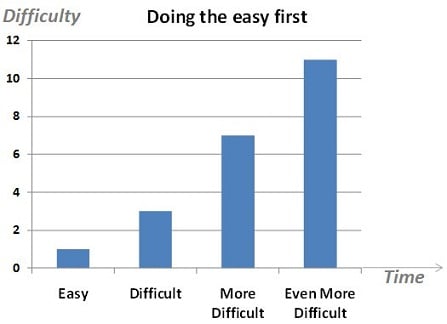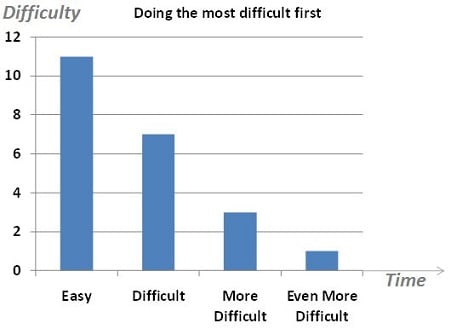It is a human tendency to take the path of least resistance. To do the easy stuff first. As we do the easy things first though, what is ahead of us is always more difficult than what we currently have. We end up living a "difficult" life with a persistent anxiety about what is next. After all, with this approach, what is next is always more difficult and we end up with more stress and less results:

Let us take a look at the alternative. If we reverse this tendency and do the most difficult first, observe what happens:

What happens is that our anxiety is gone. The next task is now easier. Most importantly, we face the real issues, get real data, gain experience, develop skills, and increase our confidence. We most often rise to the occasion and reap the benefits. Even if we don't fully succeed at the task, we still succeed at learning from it, and being able to apply this knowledge again and again.
Here are 3 ways that can help us adopt this new approach of heading towards the most difficult first:
- Start with sound task design. As I suggested a few weeks ago (see When the task seems overcomplicated or overwhelming, reconsider the "task design"!) start by setting the right expectations, then line up the necessary resources, and don't forget to break down the task into manageable components.
- Get support and advice. More often than not, the help we need to approach the most difficult is just around the corner or even in front of our eyes. All we have to do is look around and ask. People are more willing to help and provide support when we make it easy for them to do so.
- Just do it. We have heard the "just do it" a million times but hearing it and applying it are two different things. It is only when we dive into the action that we can truly experience the learning and the emotions that go with it. It is all wishful thinking until we action.
Your turn to get better at managing stress and getting business results through action with the most difficult action first! Your comments below!







 Are you struggling with a task (or a whole task list) and don't know where to start and therefore keep postponing it or avoiding it, or maybe get started and feel lost and overwhelmed? More often than not when I face a task that I perceive as over complicated or coach people who are facing such a situation, here is what we realize among other things:
Are you struggling with a task (or a whole task list) and don't know where to start and therefore keep postponing it or avoiding it, or maybe get started and feel lost and overwhelmed? More often than not when I face a task that I perceive as over complicated or coach people who are facing such a situation, here is what we realize among other things: I am not going to leave this
I am not going to leave this Environmentally aware consumers are producing less waste by practicing the "3 Rs": Reduce. Reuse. Recycle. When it comes to productivity and accomplishments, we can use these same guidelines and reap some enormous benefits:
Environmentally aware consumers are producing less waste by practicing the "3 Rs": Reduce. Reuse. Recycle. When it comes to productivity and accomplishments, we can use these same guidelines and reap some enormous benefits:
